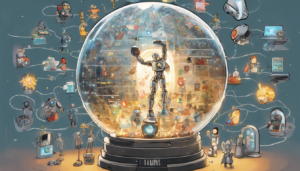Artificial intelligence (AI) is one of the most significant technologies that have emerged in the 21st century. AI is getting more powerful, and we might eventually get ASI (Artificial Super Intelligence) or AGI (Artificial General Intelligence). The future seems very promising indeed! AI will bring a lot of benefits, hopefully for us all… That’s what we will explore in this blog post, why the future of AI should be open source and how we can get there.
The Importance of AI
Before we delve into the importance of open source AI, let’s first establish why AI is essential. AI has the potential to benefit individuals and society in several ways. It can boost productivity, automate tedious tasks, provide new insights into the world around us, and entertain us. AI can also help solve complex problems, such as diseases, and level the playing field by providing equal opportunities for all.
However, the development of AI should adhere to ethical principles, respect human rights, privacy, and dignity. AI should also be transparent and accountable, and designed with safety in mind to prevent it from making harmful decisions or perpetuating bias and discrimination.
The Importance of Open Source AI
Open source AI can help level the playing field. By making AI open source, the technology becomes more accessible to a wider range of individuals and organizations, including those who may not have the financial resources to develop their own AI systems from scratch.
Open Source Enables Technology Agility:
Open source software allows developers to innovate quickly and efficiently. By leveraging the collective knowledge and experience of the community, developers can solve problems faster and create more robust software.
Open-source projects are also more secure compared to proprietary software. This is because the open-source community can review the code and identify and fix any security issues more quickly.
Another crucial reason why AI should be open source is that it enables greater transparency and ethical considerations. The consequences of AI mistakes can be significant, particularly in fields such as law, healthcare and finance. Open-source AI allows for more people to examine the code and algorithms, which helps to ensure that they adhere to ethical standards.
The Current State of AI: The Dominance of Closed-Source AI
Currently, a few major players dominate the AI industry, including Microsoft, Nvidia, OpenAI, Meta, Google, and Tesla. However, the majority of their AI software is closed source, making it difficult for other players to enter the market. Also, training a model costs billions of dollars in data center costs, which is prohibitively expensive for smaller players. This has created a situation where a few companies have all the power, which limits competition and innovation in the industry.
However, the competition between the big players in the AI industry is heating up, and there are mayor disruptions waiting to happen. Google, for example, is under pressure to find new business models beyond its search engine. They face the classical ‘innovation dilemma’: Google is forced to innovate their search by bing/chatgpt, but innovation will greatly affect existing businesses and revenue streams.
So How Do We Get to Open Source AI?
The growth of open source has been aided by several developments, including the decreasing costs of training AI models and the rapid development of AI itself. The cost of training an AI model has been decreasing by an average of 70% per year, which is opening up opportunities for smaller companies and open source communities to get involved in AI development. This is helping to drive innovation and progress in the field of AI.
Another exciting area of development in open source AI is the emergence of decentralized AI networks. Decentralized AI networks enable developers to collaborate and share resources to train AI models without relying on centralized data centers. This could revolutionize the AI industry by making AI development more affordable and accessible to smaller players.
However, there are still challenges to achieving open-source AI. To achieve open-source AI, we need a concerted effort from all stakeholders, including governments, companies, and developers.
Governments and organizations play a crucial role in promoting open source AI. Governments can provide grants and funding to research organizations and universities that focus on open-source AI development. They can also promote the use of open-source AI by adopting policies that require the use of open source software in public projects. By using open source AI, governments can encourage transparency and accountability, enabling them to trust the AI they are using.
The AI community should develop standards and guidelines for the development and use of open-source AI tools. Standards help ensure that different AI tools can work together seamlessly, promoting interoperability and compatibility. They also promote transparency and reproducibility, making it easier for developers to validate and compare AI models. Ethical guidelines must also be in place to ensure that AI is safe for use.
Incentives can help encourage developers to contribute to open-source AI projects. Organizations can offer rewards or recognition for contributors to open-source AI projects. This can help to increase the number of contributors and improve the quality of the tools developed.
Conclusion
AI has the potential to bring numerous benefits to society, but it must be developed ethically, transparently, and accountably. Open source AI can help level the playing field, promote innovation and progress, and enable greater transparency and ethical considerations. However, the dominance of closed-source AI by a few major players limits competition and innovation in the industry. To achieve open-source AI, there needs to be a concerted effort from all stakeholders, including governments, companies, and developers, to promote the use of open-source AI and develop standards and guidelines for its development and use.




